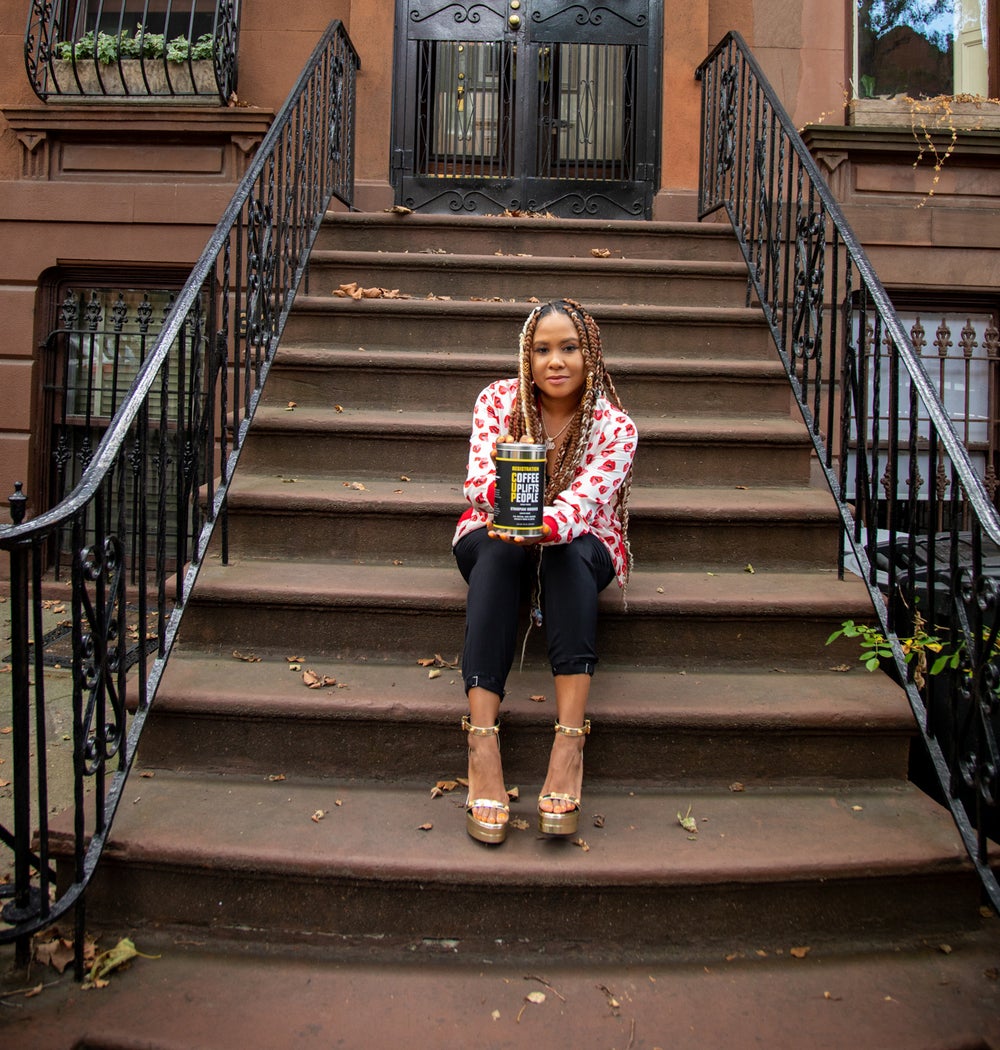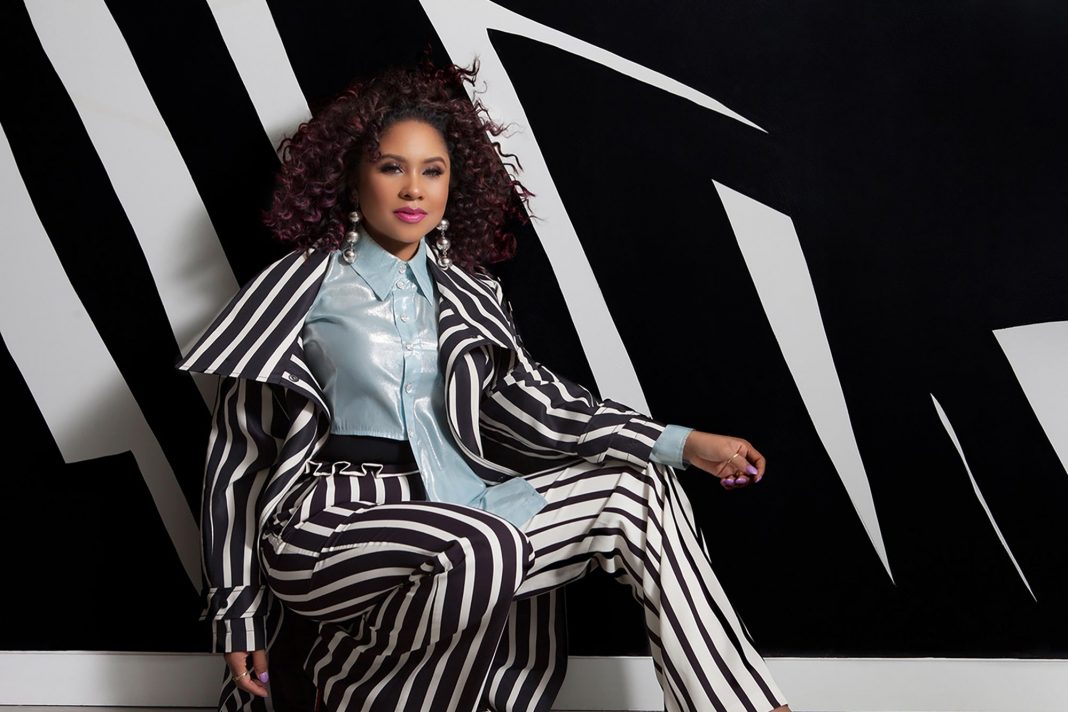Opinions expressed by Entrepreneur contributors are their own.
In honor of Women’s History Month, I had the privilege of interviewing a Black woman founder who has one foot in the business world and another in radio. Angela Yee is best known as co-host of nationally syndicated FM talkfest The Breakfast Club, but not many realize she’s also a savvy businesswoman who operates three brick-and-mortar businesses centering nutrition, education and diversity, equity and inclusion (DEI). Yee’s coffee shop, Coffee Uplifts People; juice shop, Drink Fresh Juice; and hair-care business, Private Label, all operate with primarily Black staff employed from their local communityies.

Matthew Brown
Here’s are excerpts from our recent chat interview on how this media start/entrepreneur runs her brands with DEI top of mind.
What’s something people don’t know about you that shapes how you show up in the world?
I’ve always wanted to be a writer. I’ve been working on writing projects in between my business efforts for years. When I was young, I used to write fiction stories. I was the kid who, when my parents would make me mad or say no to me, I would write a fictional story about them not being my real parents. I love horror movies; it’s my favorite genre. I feel that one day, horror books may be a theme in my work. Writing is how I channel my energy.
Related: How Jasmin Foster’s Black Woman-Owned Stationery Brand Is Bringing DEI to Target
Did entrepreneurship find you or did you set out to be a business owner?
I believe entrepreneurship was in me, but I didn’t have a name for it. From my first job working as an assistant for the Wu-Tang Clan, I had a lot of side projects. I was always the queen of side hustles. One side hustle was writing biographies for artists. Charging someone $500 to write a bio was a lot of money for me back then. It was a cool experience because I got to interview artists and write a one-pager on who they were. This was a prelude to what I do now. One of my jobs was working in a small marketing company. I was working seven days a week, writing marketing proposals, securing clients and so on. Then one day, my boss yelled at me and I was shocked because it had never happened to me before. I felt so disrespected that I picked up my laptop and never returned. That job started my entrepreneurial journey, because shortly after leaving, I started freelancing. Many of the clients that the company had wanted to continue working with me. Once I left, people were calling me and asking to hire me directly. I ended up making more money freelancing than when I was working in a company full-time. I was charging clients monthly fees without having to be in an office everyday. It inspired me to know that I had enough value to work for myself.
How can other entrepreneurs use writing to advance their careers?
Writing is one of the most important skills you can have, no matter what you do — especially if you work in marketing, advertising or on the radio like I do. The ability to write a proposal or pitch or send an email to meet with someone can really make or break entrepreneurs. I’ve received emails from people who wanted to work with me but misspelled my name or used improper grammar. I wouldn’t take those inquiries seriously. But, if you can write something compelling that’s well-thought out, that’s something that I’d consider.
Has being a woman founder of color impacted the way that you navigate the business world?
Absolutely. It’s been hard because I still struggle with imposter syndrome. Sometimes I feel that I’m not smart enough or that I don’t belong in a certain room. Starting out in radio, I was looked at as a sidekick. Fortunately, I was given the opportunity to have my own show, but I was considered an assistant for a long time. I rebelled against that notion because I had so much to prove. Most of the jobs I’ve worked at, I was the only woman. When we’re live on The Breakfast Club, I’m still the only woman in the room. I do the most work because I have to prove myself. If I were a man, I don’t think I’d be the same way. I feel that I have to be more prepared than anyone else, yet I still don’t get the same respect. I do all of this work just to be considered equal.

Image credit: Courtesy of CUP Coffee
What’s been your biggest struggle, and triumph, as a woman-of-color founder?
People think you’re only there to fill a quota, so they may not take you seriously. That happened to me even when I applied for college. A man who wasn’t accepted told me, “You’re only there because you’re a Black woman.” I took a step back and said, Wwell actually my SAT scores were higher than yours.” He was upset because he wasn’t accepted, but he really believed I was admitted because of my race and gender. Early on in my career, I also had people look at me and say, “Who did she sleep with to get that job?” On the other hand, some of my triumphs have been the support from my sisterhood. There’s a misconception that Black women don’t support each other. It’s definitely not true. My biggest supporters have been women who have reached out to help me, collaborate and lift me up. Of everyone who’s been helpful and supportive to me, it’s been Black women. There’s no one else I’d rather be than a Black woman.
What advice would you give to other Black women who want to start a business?
Don’t be afraid to ask for help. Sometimes, Black women don’t want to ask for help because we think it’s weak. Truthfully, people do want to help us, and helping us can benefit them, too. When people want me to mentor them, I’ll have them do work for me and pay them for it. If you want someone to mentor you, do your research on them and bring something to the table. That’s more valuable to me. I would also say write down your ideas. Everytime I have a great idea, I forget it in an hour. I believe writing things down helps you remember and manifest them. Also, learn how to pitch your business and put together a deck. I love watching Shark Tank and studying everyone else’s pitch. Then when it’s my time to pitch, I can do it effectively.
You’re a big supporter of Black-owned businesses and make a point to employ Black workers. Why is that so important to you?
Representation is important. I’m aware of my presence in the neighborhood. I still live in Brooklyn, and my businesses are here, too. People see me, I walk around all the time, and I’m approachable. When kids can come into your business and see someone like myself as the business owner, it inspires them. I tell my employees: I don’t want you to work here forever. I want you to think about things you can do to improve the business and let me know what we can implement. I tell them if they want more responsibility, I’ll give it to them. I want them to eventually own their own businesses. For the coffee shop I own, the goal is to make it into a franchise. I would love to help my employees open their own franchise. Being a Black-owned business is not a competition. I visit other Black-owned coffee shops and juice bars, take photos and share them on social media. There’s space for all of us to be successful.
How else do you serve those in the surrounding community?
The businesses I have in Brooklyn are all about health and nutrition. Prior to the pandemic, my juice bar had a lot of in-person events. When I first opened, I envisioned it being a community-oriented space where people would come together. We had weekly meetings and book clubs with an entire library. People come and take the books, but I don’t mind. I support reading and literature, and I even work with the New York Public Library. That’s me: reading and wellness. From my coffee shop to my juice bar, I stress the health benefits of coffee and freshly pressed juice. My juice bar is a labor of love. It’s a place where you can see the difference in people’s lives. During the pandemic, I saw what a huge difference it made for someone to bring a sick family member into my juice bar.
How do your roles as radio host and business owner complement each other?
If you listen to The Breakfast Club, I’m the one who’s always on time. I get to work before everyone else and I do all of the research. That discipline helps me in all facets of life. I don’t like feeling rushed or being late. Being late is very disrespectful to our listeners, whoever I’m meeting with and of other people’s time. Even though I do a lot of time-consuming research, it’s good for me because it makes me well-rounded. Whether it’s about health and culture or finance and NFTs, it serves me in the grand scheme of things. I know a lot of people who say they don’t know a lot about different topics. It’s great for me to have some knowledge about a range of subjects. Knowledge is so important because when I walk into different spaces and feel imposter syndrome, at least I feel like I know a little something. It’s important for me to be around different types of people and know what’s happening in the world. Knowledge gives me an edge over other people.
Related: It’s Black History Month. Here’s How to Show Black Employees You Care.
Nika: Is there anything else you want us to know?
I finally started my own nonprofit called Well Read, which is about wellness and literacy. As you become more successful, it’s important for you to give back. Even if you can’t financially give back, kind words and sharing about other businesses on social media means so much. Every little thing counts. Help out your friends and family with advice, encouragement and support.
Angela Yee’s can be found in Brooklyn at one of her businesses and on the radio.
Check out Angela’s non-profit, Well Read: www.wethewellread.com, her coffee shop, Coffee Uplifts People and her juice shop, Juices for Life.




